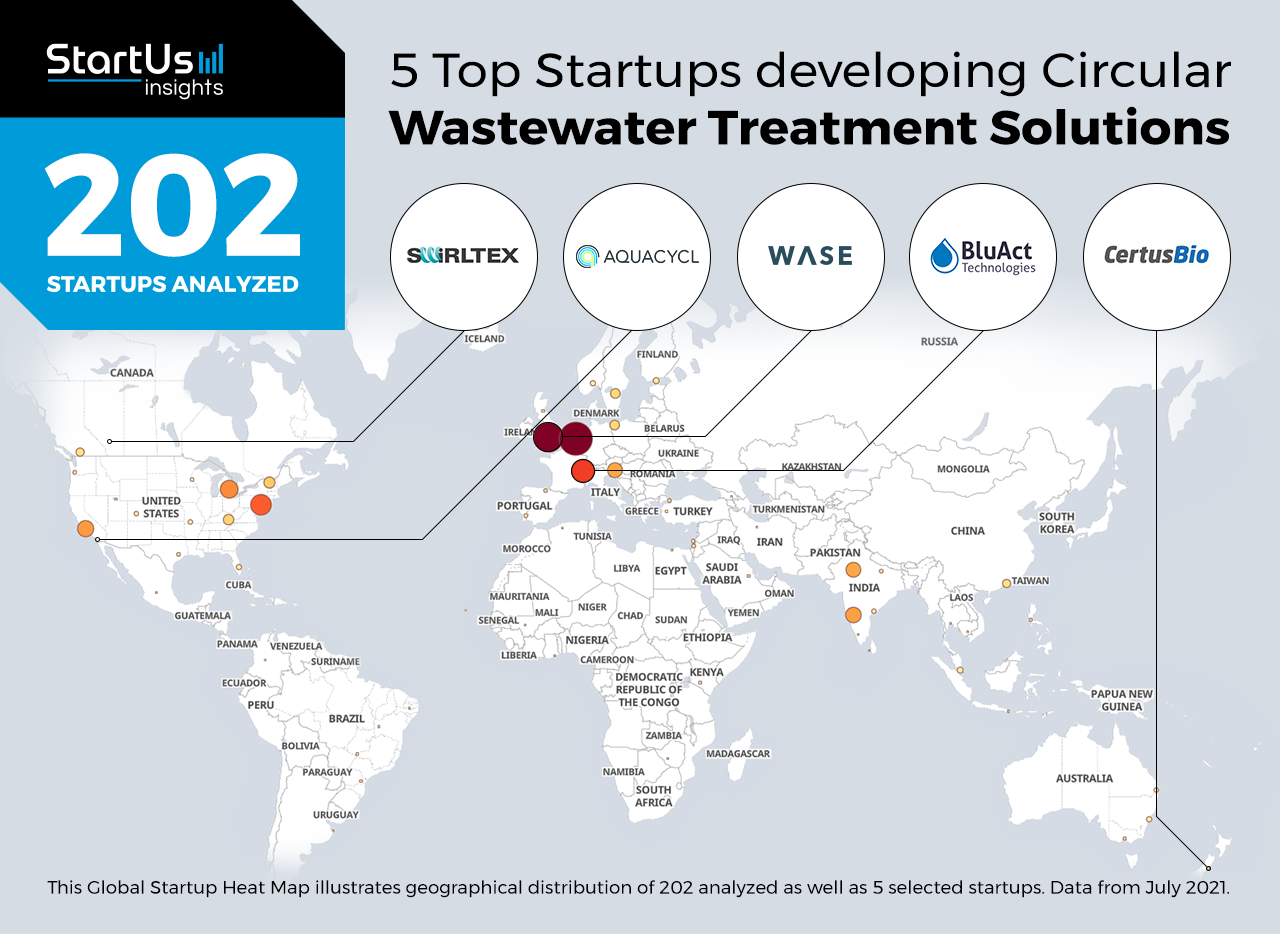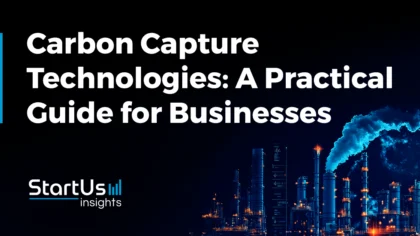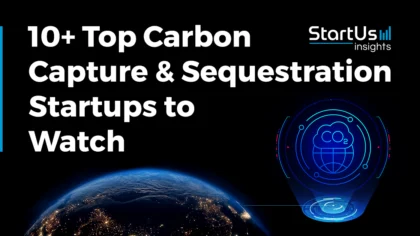Staying ahead of the technology curve means strengthening your competitive advantage. That is why we give you data-driven innovation insights into the circular economy. This time, you get to discover 5 hand-picked startups developing circular wastewater treatment solutions.
Global Startup Heat Map highlights 5 Top Circular Wastewater Treatment Solutions out of 202
The insights of this data-driven analysis are derived from the Big Data & Artificial Intelligence-powered StartUs Insights Discovery Platform, covering 2.093.000+ startups & scaleups globally. The platform gives you an exhaustive overview of emerging technologies & relevant startups within a specific field in just a few clicks.
The Global Startup Heat Map below reveals the distribution of the 202 exemplary startups & scaleups we analyzed for this research. Further, it highlights 5 startups that we hand-picked based on criteria such as founding year, location, funding raised, and more. You get to explore the solutions of these 5 startups & scaleups in this report. For insights on the other 197 circular wastewater treatment solutions, get in touch.

Swirltex converts Wastewater-to-Resources
Wastewater streams, particularly from industrial facilities, often contain suspended solids. These include nutrients and other chemicals that find applications as raw materials for the same facilities or even in different industries. Wastewater treatment systems recover these solid wastes and bring them back in the loop. By enabling the transition from wastewater to resource, such solutions advance the circular economy.
Canadian startup Swirltex builds proprietary wastewater treatment solutions. The startup provides wastewater systems for different applications, including produced water, dairy wastewater, and wastewater from food & beverages processing. Its solutions utilize tubular membranes that effectively separate solids and liquids based on buoyancy. By recovering suspended solids as potential resources, the startup’s solutions reduce energy consumption and advance the circular economy.
Aquacycl offers a Waste-to-Electricity Solution
Food and other organic waste are major contributors to methane and other greenhouse gases (GHG). Much of it finds its way from households, restaurants, and food processing units into sewages. To address this problem, startups are leveraging waste-to-energy technologies to treat this waste. In addition to processing wastewater, this advances sustainability by lowering emissions and providing clean energy.
Aquacycl is a US-based startup offering a waste-to-electricity solution. The startup’s BioElectrochemical Treatment Technology (BETT) utilizes electricity-producing bacteria to speed up the process of wastewater treatment. It comes in three capacities ranging from a maximum flow rate of 38 to 152 cubic meters per day. The bacteria transform nearly all waste into electrons, protons, and dissolved carbon dioxide. Moreover, the process eliminates primary sludge and reduces secondary sludge as well as produces electricity and new molecular water.
CertusBio provides Wastewater Monitoring Devices
Wastewater from process industries often contains materials lost from different stages such as handling, transfer, and production. Monitoring this loss is critical to taking steps to reduce material waste. Moreover, it also brings these materials back into the loop. This is why startups offer wastewater monitoring devices that detect the presence of valuable materials in industrial wastewater streams.
CertusBio is a New Zealand-based startup developing wastewater monitoring devices. Its technology uses lab-on-a-chip (LOC) biosensors to continuously monitor wastewater without disrupting plant operations. This allows process companies to identify the nature of wastewater as well as reduce wastewater treatment costs. For instance, tracking milk solids and lactose in wastewater allows dairy processing units to monitor and reduce product losses.
WASE builds Electro-Methanogenic Reactors (EMR)
Many traditional organic waste-to-energy systems utilize anaerobic digestion (AD) to break down waste into energy. However, the process is not efficient due to the heterogeneous nature of waste. EMRs combine the biological reactions of AD with bioelectrochemical processes, providing greater efficiency. These reactors use microbes on anodes and cathodes to catalyze the conversion of waste into electricity.
British startup WASE provides EMR reactors for wastewater treatment. The startup’s industrial waste management system, industriWASE, treats wastewater and organic waste on-site to provide bioenergy. It produces biogas, which is used for heat generation or converted into bioelectricity, and a natural fertilizer as a byproduct. The startup also offers saniWASE and agriWASE, systems that process sewage sludge and agricultural waste, respectively.
BluAct Technologies enables Metal Recovery
Industrial wastewater contains trace amounts of heavy metals like aluminum and chromium and precious metals like silver and platinum. Recovering these materials from wastewater presents a circular and sustainable alternative to traditional mining. To achieve this, startups are developing innovative membranes, as well as physical and biological techniques, to extract metals from wastewater.
Swiss startup BluAct Technologies offers wastewater purification technology. It uses amyloid-carbon hybrids to separate heavy metals and radioactive materials from water samples. The technology also removes organic pollutants, pesticides, and pharmaceutical ingredients. In addition to municipal water treatment, the startup’s solution finds application in mining and rare earth metal recovery as well as food & beverage applications.
Discover more Circular Economy Startups
Startups such as the examples highlighted in this report focus on Bio-based Materials, Remanufacturing, Blockchain as well as Waste-to-Resource Solutions. While all of these technologies play a major role in advancing the Circular Economy, they only represent the tip of the iceberg. To explore more technologies, simply get in touch to let us look into your areas of interest. For a more general overview, you can download one of our free Industry Innovation Reports to save your time and improve strategic decision-making.








